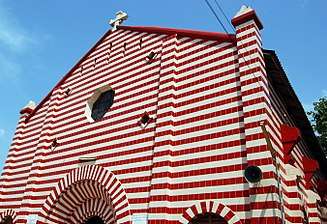Christianity in Benin
Christians in Benin constitute approximately 42.8 percent (~3,762,904) of the country's population (8,791,832[1] - 2009 est.)
According to the 2002 census, 27.1 percent of the population of Benin is Roman Catholic, 5 percent Celestial Christian, 3.2 percent Methodist, 7.5 percent other Christian groups[2] (Baptists, Assemblies of God, Pentecostals, Seventh-day Adventists, the Church of Jesus Christ of Latter-day Saints (Mormons), Jehovah's Witnesses, Rosicrucians, the Unification Church).

Christianity first reached Benin in 1680, gaining more permanent footing in the 19th century. English Methodists arrived in 1843, operating amongst the coastal Gun people.[3]
Roman Catholicism
The Catholic hierarchy in Benin consists of the Archdiocese of Cotonou (including the Dioceses of Abomey, Dassa-Zoumé, Lokossa, Porto Novo) and the Parakou (including the Dioceses of Djougou, Kandi, Natitingou, and N'Dali).
In 2011 it was reported that in Benin there were 440 priests and 900 men and women in religious orders.[4]
Many nominal Christians also practice traditional local religious beliefs.[2]
See also
References
- ↑ "The World Factbook". Cia.gov. Retrieved 2013-10-21.
- 1 2 International Religious Freedom Report 2007: Benin. United States Bureau of Democracy, Human Rights and Labor (September 14, 2007). This article incorporates text from this source, which is in the public domain.
- ↑ "Country Profile: Benin". Sim.org. Retrieved 2013-10-21.
- ↑ Houngnikpo, Mathurin C.; Decalo, Samuel (2013). Historical Dictionary of Benin. Rowman & Littlefield. p. 94. ISBN 0810871718. Retrieved 28 July 2015.

